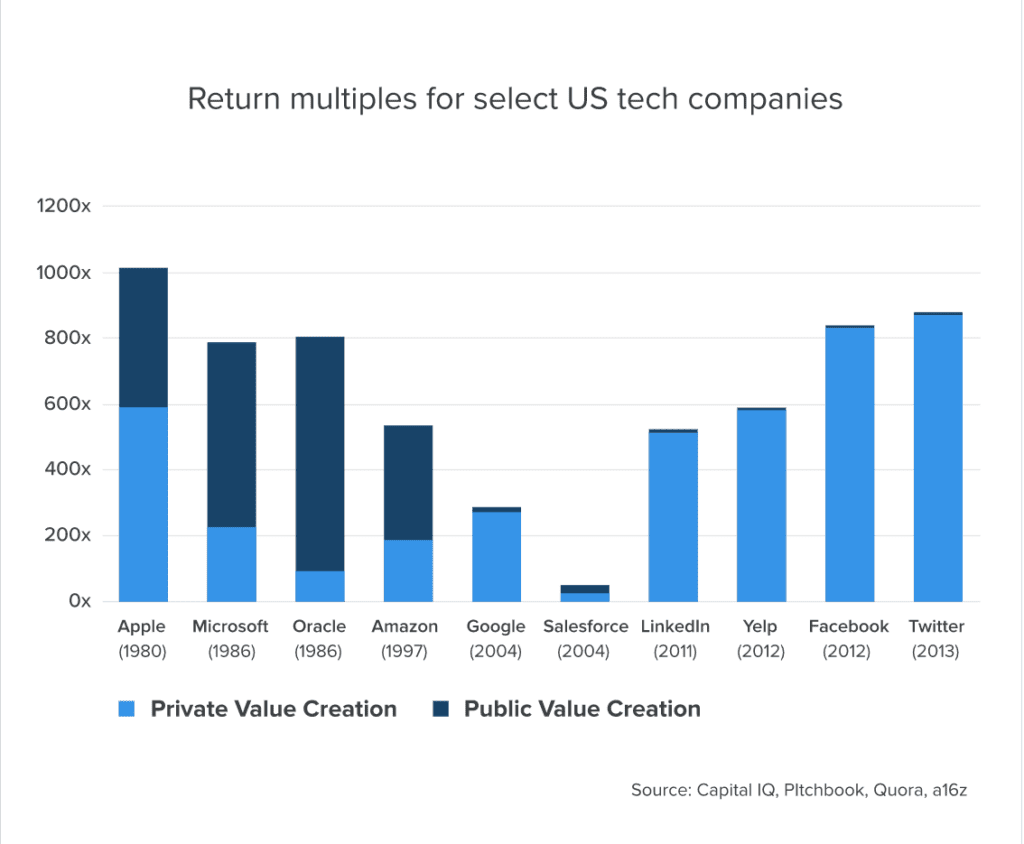Many investors want to invest in startups because they have heard stories of the tremendous wealth created by some startups that have gone on to do incredible things.
As the chart below illustrates, in recent years much of the wealth creation has shifted from the time a company is public to the time prior the company becoming public. In other words, getting invested early, including startups, prior to a company going public is a rewarding.

That is not to say that you can’t build wealth by investing in public companies. Many people have done just that. Instead, it means that if you want to build life changing wealth, you need to allocate a small portion of your investing capital into pre-IPO businesses, including startups.
What if you could have invested alongside Jeff Bezos when he was beginning his Amazon journey? No doubt those that believed in Bezos and his vision for Amazon have gone on to be quite rich.
There are many tech startups to invest in, but an even greater number of non-tech startups. Recent studies show that there has been between 700,000 and 800,000 new business startups annually over the last five years.
With that many potential investment opportunities you need to know how to invest in startups. And for those less tech savvy investors you need to know which technologies are best, so you know which tech startups to invest in.
People can invest in startups via equity or debt depending on the business opportunity and you need to look at things on a case-by-case basis.
Ten years ago, the idea to invest in startups was limited to an elite group of accredited investors and venture capital funds. Things got a lot simpler for individual investors in 2012 when Congress passed the JOBS Act, which eased the country’s security regulations.
With the passing of the JOBS act, non-accredited investors (which is most of us) can invest between $2,000 and $100,000 annually (depending on your annual income and net worth) in startups businesses. This was a huge step for the smaller investor who previously was shut out of most of these startup deals.
With the passing of the legislation in 2012, a new mini-industry call crowdfunding sprung up for this new type of smaller investor. Crowdfunding is a great name describing the investing of small amounts by a large number of investors to funding various businesses, including startups.
Fast forward eight years and you can now go onto many crowdfunding platforms to review prospectuses, perform due diligence and invest in these kinds of startups. All the information you need to make an investment decision is right there on the funding portal. You might be asked to invest in stock, debt, or convertible debt, but either way you get to perform due diligence and decide.
In many ways these funding portals supply the same information as you would get from your broker about a publicly held stock you own.
There are many options when it comes to investing in startups.
Most important to note is that investing in startups is very risky and should only be done with a small percentage of your hard-earned investment dollars held in your investment portfolio.
Startup debt and equity is very illiquid, meaning that you will need to keep your money invested for at least three to five years. During that time, you will either watch the business do great things and possibly get a good return or be unsuccessful such that your investment will be impaired, possibly all the way to zero.
If you are like most people and are new to investing in startups, you want to discuss options with financial advisors to get their investment advice on whether this kind of investing is right for you.
If you are comfortable with the risks noted above, there are great reasons to invest in startups. One reason might be that you love the idea of the startup and want to “change the world”. Others invest in startups because there is a personal connection to the management team, and you believe in them. Or finally, you may be excited by the idea of getting in on the ground floor of possibly the next Amazon or Snowflake.
At Wealthplicity, we have taken the time to review the best crowdfunding sites to help you in your due diligence when it comes to startup investing.
We looked at five important criteria for users interested in using crowdfunding for startups:
You can find our full reviews at The Best of Investing Resources.